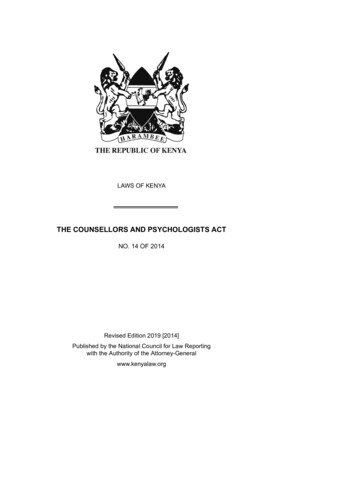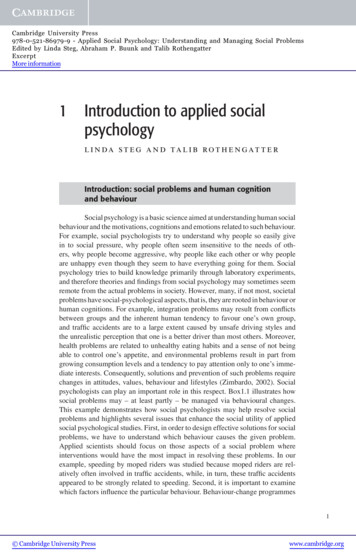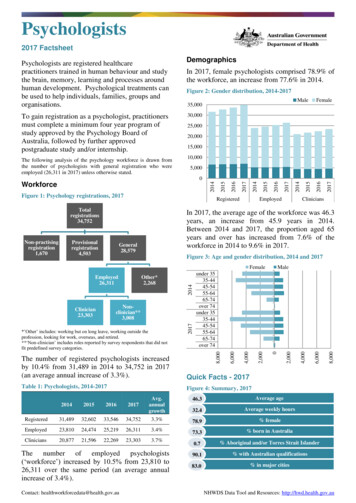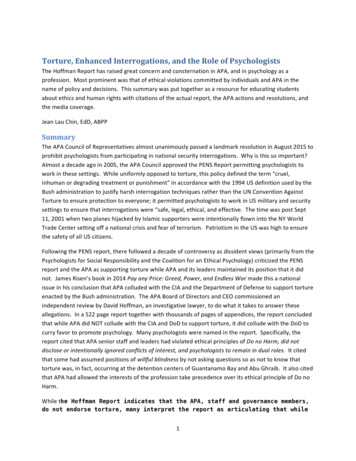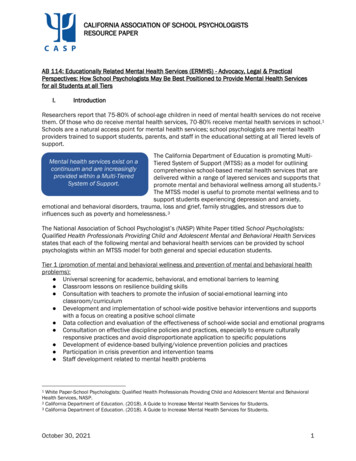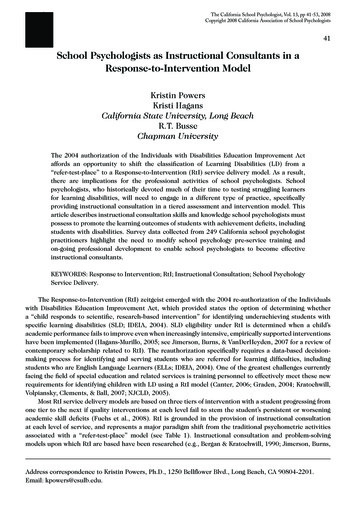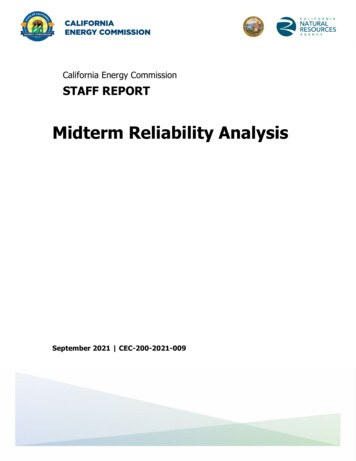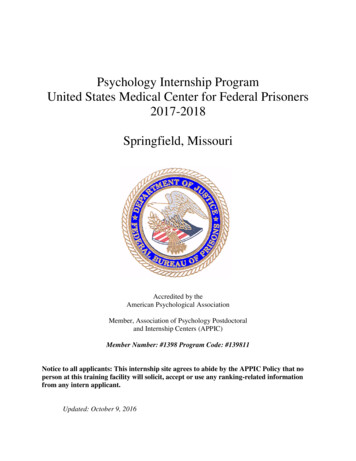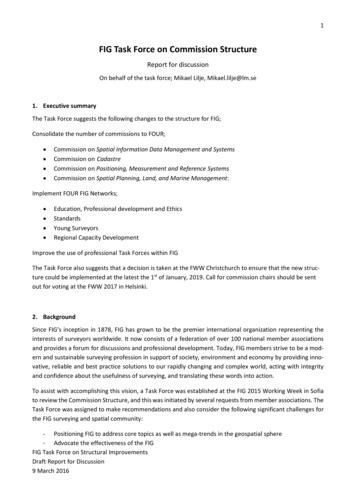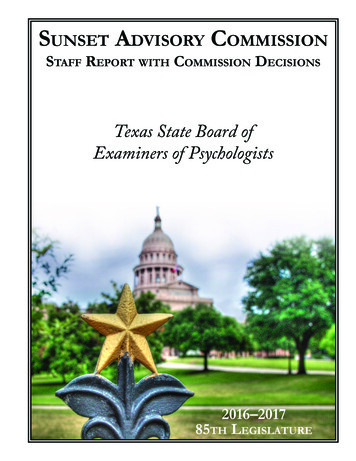
Transcription
Sunset Advisory CommissionStaff Report with Commission DecisionsTexas State Board ofExaminers of Psychologists2016–201785th Legislature
Sunset Advisory CommissionRepresentative Larry GonzalesChairSenator Van TaylorVice ChairRepresentative Cindy BurkettSenator Juan “Chuy” HinojosaRepresentative Dan FlynnSenator Robert NicholsRepresentative Richard Peña RaymondSenator Charles SchwertnerRepresentative Senfronia ThompsonSenator Kirk WatsonWilliam MeadowsLTC (Ret.) Allen B. WestKen LevineDirectorCover Photo: The iron perimeter fence was installed in the 1890s, a few years after the completion of the Texas StateCapitol. The fence surrounds approximately 22 acres of the Capitol Grounds but only on the east, west, and south sidesdue to the addition of the Capitol Extension to the north in the early 1990s. Photo Credit: Janet Wood
Texas State Board ofExaminers of PsychologistsSunset Staff Report with Commission Decisions2016–201785th Legislature
HowtoRead Sunset ReportsEach Sunset report is issued three times, at each of the three key phases of the Sunset process, to compileall recommendations and action into one, up-to-date document. Only the most recent version isposted to the website. (The version in bold is the version you are reading.)1. Sunset Staff Evaluation PhaseSunset staff performs extensive research and analysis to evaluate the need for, performance of,and improvements to the agency under review.First Version: The Sunset Staff Report identifies problem areas and makes specificrecommendations for positive change, either to the laws governing an agency or in the form ofmanagement directives to agency leadership.2. Sunset Commission Deliberation PhaseThe Sunset Commission conducts a public hearing to take testimony on the staff report and theagency overall. Later, the commission meets again to vote on which changes to recommend tothe full Legislature.Second Version: The Sunset Staff Report with Commission Decisions, issued after thedecision meeting, documents the Sunset Commission’s decisions on the original staffrecommendations and any new issues raised during the hearing, forming the basis of theSunset bills.3. Legislative Action PhaseThe full Legislature considers bills containing the Sunset Commission’s recommendations oneach agency and makes final determinations.Third Version: The Sunset Staff Report with Final Results, published after the end of thelegislative session, documents the ultimate outcome of the Sunset process for each agency,including the actions taken by the Legislature on each Sunset recommendation and any newprovisions added to the Sunset bill.
TableofContentsPageSunset Commission DecisionsTexas State Board of Examiners of Psychologists.A1Summary of Sunset Staff Recommendations.1Agency at a Glance.5Issues/Recommendations1The Board’s Oral Exam Is an Unnecessary Requirement for Licensure.92Requiring a Year of Post-Doctoral Supervision Is an UnnecessaryHurdle to Licensure, Potentially Contributing to the Mental HealthCare Provider Shortage in Texas.153Key Elements of the Board’s Licensing and Regulatory FunctionsDo Not Conform to Common Licensing Standards.194Texas Should Continue Regulating Psychologists, but Decisions on theStructure of the Texas State Board of Examiners of Psychologists AwaitFurther Review.27A Recent Court Decision Opens the Door to Unlicensed Practiceof Psychology.335AppendicesAppendix A — Historically Underutilized Businesses Statistics.39Appendix B — Equal Employment Opportunity Statistics.41Appendix C — Health Professions Council.43Appendix D — Oral Exam Process.45Appendix E — Statutory Scope of Mental and Behavioral Health Professions.47Appendix F — Staff Review Activities.51
Sunset Commission Decisions
Sunset Advisory CommissionJanuary 2017Sunset Commission DecisionsSummaryThe following material summarizes the Sunset Commission’s decisions on the staff recommendationsfor the Texas State Board of Examiners of Psychologists, as well as modifications and new issues raisedduring the public hearing.As a small, independent occupational licensing agency, the psychology board faces a number ofadministrative hurdles that detract from its ability to efficiently serve the people of Texas. Whenconsidering the recommendations in the separate Health Licensing Consolidation Project Sunset StaffReport, the commission chose to recommends consolidating the psychology board with the boardsgoverning the regulation of marriage and family therapists, professional counselors, social workers, andsex offender treatment providers as well as the regulation of licensed chemical dependency counselors.The proposed umbrella licensing agency, the Texas Behavioral Health Executive Council (BHEC), willallow for improved services to license holders, while ensuring each profession continues to set standardsof practice.The commission also recommends eliminating a number of unnecessary barriers to entry into thepsychology profession to help address the shortage of mental health care providers in Texas. Theserecommendations include eliminating the subjective oral examination that places a significant strain onagency resources and creates a bottleneck to licensing, as well as the requirement for psychologists tocomplete a year of supervised work experience after receiving a Ph.D. Other recommendations aim tobetter ensure fair and effective regulation of psychology in Texas by updating licensing and enforcementprocesses that have not kept up with best practices. The commission also directed the psychologyboard to appoint a working group of stakeholders to develop proposed definitions of psychology forconsideration by the 85th Legislature to replace the current definition that was ruled unconstitutionalin a recent court case.Issue 1The Board’s Oral Exam Is an Unnecessary Requirement for Licensure.Recommendation 1.1, Adopted — Eliminate the statutory authority for the psychology board toadminister an oral exam.Issue 2Requiring a Year of Post-Doctoral Supervision Is an Unnecessary Hurdle toLicensure, Potentially Contributing to the Mental Health Care Provider Shortagein Texas.Recommendation 2.1, Adopted — Remove the statutory requirement for psychologists to earn halfof their supervised work experience after receiving their Ph.D.Texas State Board of Examiners of Psychologists Staff Report with Commission DecisionsSunset Commission DecisionsA1
January 2017Sunset Advisory CommissionIssue 3Key Elements of the Board’s Licensing and Regulatory Functions Do Not Conformto Common Licensing Standards.Recommendation 3.1, Adopted — Remove the statutory limitation restricting the board’s authorityto set fees.Recommendation 3.2, Adopted — Remove subjective licensure qualifications.Recommendation 3.3, Adopted — Remove the requirement for a separate provisional psychologistlicense and instead authorize the board to grant provisional status to applicants for full licensure.Recommendation 3.4, Adopted — Authorize the board to provide biennial license renewal.Recommendation 3.5, Adopted — Authorize the board to issue remedial plans to resolve minorcomplaints.Recommendation 3.6, Adopted — Clarify the agency’s authority to require physical or mental evaluationsand hold related hearings for noncompliance.Recommendation 3.7, Adopted — Extend confidentiality of complaint and investigative informationto applicants and non-licensees.Recommendation 3.8, Adopted — Direct the board to remove the requirement for letters of reference.(Management action – nonstatutory)Recommendation 3.9, Adopted — Direct the board to prohibit a board member from participating inboth the investigation and resolution of a complaint. (Management action – nonstatutory)Issue 4Texas Should Continue Regulating Psychologists, but Decisions on the Structureof the Texas State Board of Examiners of Psychologists Await Further Review.Recommendation 4.1, Modified — This decision was made as part of the consideration of the HealthLicensing Consolidation Project Sunset Staff Report.As a modified approach to the staff recommendation, the commission recommends continuing theregulation of psychologists and merging the Texas State Board of Examiners of Psychologists with the fivebehavioral health boards and programs currently housed at the Department of State Health Services tocreate the Texas Behavioral Health Executive Council (BHEC), a functionally aligned umbrella licensingagency. The merger would take place no later than September 1, 2018, and have a Sunset date of 2029.The current governor-appointed psychology board would remain intact and retain responsibility fordeveloping rules and guiding matters relating to the psychology profession. The board would appointone of its professional members and one of its public members to serve on the nine-member executivecouncil. The executive council would review and have final approval authority over the rules relating toscope of practice, standards of care, and ethics written by the board, and would have the responsibilityA2Texas State Board of Examiners of Psychologists Staff Report with Commission DecisionsSunset Commission Decisions
Sunset Advisory CommissionJanuary 2017to adopt rules relating to BHEC operations and standardized regulatory procedures such as licenseapplications, investigatory practices, and enforcement processes.Recommendation 4.2, Adopted — Update the standard across-the-board requirement related to boardmember training.Issue 5A Recent Court Decision Opens the Door to Unlicensed Practice of Psychology.Recommendation 5.1, Modified — Rather than directing the Texas State Board of Examiners ofPsychologists to develop proposed definitions of the practice of psychology, the Sunset Commissiondirected the board to appoint a working group of stakeholders to develop the proposed definitions. Thestakeholders may include, but not be limited to, psychologists, counselors, therapists, life coaches, selfhelp groups, and medical professionals and their respective associations. The proposals must include atleast three options, including one broad and one narrow definition of psychology. The narrow definitionshould attempt to capture what core psychological services are as compared to other similar services suchas counseling or therapy. The psychology board should provide these proposals to the Senate Healthand Human Services Committee and the House Public Health Committee, as well as to the SunsetCommission, no later than January 31, 2017. (Management action – nonstatutory)Recommendation 5.2, Not Adopted — Request the Senate Health and Human Services Committeeand the House Public Health Committee to take action to define the practice of psychology, as well asto potentially clarify the scope of practice of other mental health professionals. (Management action– nonstatutory)Adopted New IssuesPsychological Services in Private SchoolsDirect the Texas State Board of Examiners of Psychologists to amend its rules to allow Licensed Specialistsin School Psychology to practice in both public and private schools. (Management action – nonstatutory)Psychology Interjurisdictional CompactAdopt the Psychology Interjurisdictional Compact (PSYPACT) in statute.Review of Potential Anti-Competitive RulesDirect the Texas State Board of Examiners of Psychologists to evaluate all rules in the context of theSupreme Court decision in North Carolina State Board of Dental Examiners v. Federal Trade Commissionto ensure rules do not run afoul of the anti-competitive prohibitions of the Sherman Antitrust Act andclearly reflect state policies expressed by the Legislature in statute. The board should repeal any rulethat, after its evaluation, it deems susceptible to legal challenge based on precedent in the SupremeCourt ruling. If unclear about the impact of certain rules, the board may request an opinion from theAttorney General. (Management action – nonstatutory)Texas State Board of Examiners of Psychologists Staff Report with Commission DecisionsSunset Commission DecisionsA3
January 2017Sunset Advisory CommissionFiscal Implication SummaryTexas Behavioral Health Executive CouncilConsolidating the five programs from DSHS and the Board of Examiners of Psychologists into the TexasBehavioral Health Executive Council would have an initial negative fiscal impact to the state over thenext five fiscal years. The majority of these costs are necessary to transfer and maintain electronic dataat the level needed for effective regulation, as well as eliminate the large backlogs of enforcement casesand complaints that have accrued at DSHS. The new agency would have 45.5 full time staff positions.This figure includes the existing staff positions from each consolidated agency and program and threenew staff positions to address the backlog of cases. Once the backlog is resolved, these positions wouldno longer be necessary. Once the merger is complete and fully operational, additional FTE reductionswould be expected from efficiencies gained from removing duplication of effort.Health Licensing Consolidation ProjectFiscalYearCost to theGeneral Revenue FundCurrentAgency FTEsBHECFTEsFTE ChangeFrom FY172018 469,69242.51 12019 223,523045.5 32020 206,618045.5 32021 27,752042.502022 27,752042.50Texas State Board of Examiners of PsychologistsThe Sunset Commission’s recommendations related to the Board of Examiners of Psychologists wouldresult in a small negative fiscal impact to the state over the next five years, primarily resulting from theelimination of the board’s oral exam. The board collects about 77,000 in oral examination fees eachyear. The agency estimates administering the oral exam costs about 46,000 annually, which wouldoffset some of the lost revenue.Texas State Board ofExaminers of PsychologistsA4FiscalYearLoss to theGeneral Revenue Fund2018 31,0002019 31,0002020 31,0002021 31,0002022 31,000Texas State Board of Examiners of Psychologists Staff Report with Commission DecisionsSunset Commission Decisions
Summary of SunsetStaff Recommendations
Sunset Advisory CommissionJanuary 2017SummaryOverall, the Sunset review found the psychology board is a generally wellrun agency. However, unlike 35 other states, Texas continues to regulatepsychology through an independent board, inefficiently paying for all theadministrative trappings required of an independent agency. The small sizeof the psychology board has also placed a number of administrative millstoneson it. Most notably, the board’s unnecessary oral examination places anextraordinary strain on agency staff and resources and creates a bottleneck toentry into the profession. As in the previous Sunset review in 2004, Sunsetstaff found the oral examination is an outdated practice thatintroduces subjectivity into the licensing process and offerslittle value in assessing candidates’ minimum competency to The board unnecessarily limitspractice psychology. Additionally, requiring candidates forentry into the profession.licensure to complete a year of supervised work experienceafter receiving a Ph.D. adds another unnecessary hurdle tolicensure, one that is no longer universally accepted. Together, these practicesadd minimal extra protection to the public and could affect the mental healthprovider shortage in Texas.Scope of practice is typically well-outside the purview of a Sunset review, unlessa scope issue prevents the agency from carrying out its statutory responsibilities.In this case, a significant court ruling has effectively prevented the psychologyboard from taking legitimate actions for any unlicensed practice of psychology.In January 2016, the U.S. Court of Appeals for the 5th Circuit found Texas’definition of “psychological services” to be unconstitutionally overbroad anda violation of free speech. In essence, the court found that under the currentdefinition, many individuals who provide advice or counseling as part of dayto-day life — from yoga instructors to advice columnists — could be consideredto be practicing psychology without a license and subject to enforcement bythe board. While focused on preventing such obvious overreach, the court’sopinion creates both obstacles and an opportunity to establish a new definitionof psychology to appropriately protect the practice of psychology for Texanswho receive services.Finally, in common with many of the other small licensing agencies currentlyunder review, Sunset staff considered whether an independent agency is themost appropriate structure to regulate the practice of psychology. However, thedecision to recommend an alternative organizational structure for the agencymust be made in conjunction with the Sunset reviews of other health licensingagencies, due for completion in mid-November. Together, these reviews willconsider the potential benefits of consolidation and determine if they aresignificant enough to justify a major organizational change. Regardless ofthe organizational structure, the agency should implement the best practicesoutlined in this report to gain efficiencies and better ensure fair and effectiveregulation of psychological services.Texas State Board of Examiners of Psychologists Staff Report with Commission DecisionsSummary of Sunset Staff Recommendations1
January 2017Sunset Advisory CommissionThe following material summarizes the Sunset staff recommendations on the Texas State Board ofExaminers of Psychologists.Issues and RecommendationsIssue 1The Board’s Oral Examination Is an Unnecessary Requirement for Licensure.The oral examination is an outdated licensing requirement that offers little value in assessing candidates’minimum competency to practice psychology. Licensure as a psychologist already requires a doctoraldegree, passage of a national written examination and jurisprudence examination, and completion of3,500 hours of supervised experience. In addition to concerns about the fairness and consistency ofthe exam administration, conducting an oral exam twice a year puts an undeniable strain on agencystaff and resources, while creating a bottleneck to entry into the profession. Nationally, the psychologyprofession has moved away from using oral examinations. With only eight states continuing to use anoral exam to assess competency, this exam prevents psychologists from easily moving their practice toTexas to help meet the state’s mental health provider shortage.Key Recommendation Eliminate the statutory authority for the psychology board to administer an oral exam.Issue 2Requiring a Year of Post-Doctoral Supervision Is an Unnecessary Hurdle toLicensure, Potentially Contributing to the Mental Health Care Provider Shortagein Texas.Psychologist candidates must complete two years of supervised work experience before becoming fullylicensed. Statute requires half of this experience to be completed after candidates receive their Ph.D.Current doctoral degree programs include substantially more practical experience than at the time Texasenacted this post-doctoral supervision requirement. Recognizing the change in doctoral education andtraining, the national trend has begun shifting away from requiring a set number of hours be completed ina post-doctoral setting. Today, 15 states and the American Psychological Association have adopted policiesthat do not distinguish between pre-doctoral and post-doctoral work experience. Requiring candidatesto often repeat hours of experience earned during their degree program adds minimal protection anddelays licensure of psychologists at a time when Texas faces a shortage of mental health care providers.Key Recommendation 2Remove the statutory requirement for psychologists to earn half of their supervised work experienceafter receiving their doctoral degree.Texas State Board of Examiners of Psychologists Staff Report with Commission DecisionsSummary of Sunset Staff Recommendations
Sunset Advisory CommissionJanuary 2017Issue 3Key Elements of the Board’s Licensing and Regulatory Functions Do Not Conformto Common Licensing Standards.Sunset staff found some of the board’s licensing and enforcement processes do not match model standardsor common practices observed in other regulatory agencies. Specifically, requirements to apply for aprovisional license and to submit letters of recommendation make the process for becoming a licensedpsychologist overly burdensome. The board also lacks certain tools, such as issuing remedial nondisciplinary sanctions and ordering show-cause hearings regarding competency, necessary to effectivelyenforce the psychology statute and board rules.Key Recommendations Remove the requirement for a separate provisional psychologist license and instead authorize theboard to grant provisional status to applicants for full licensure.Authorize the board to issue remedial plans to resolve minor complaints.Clarify the agency’s authority to require physical or mental evaluations for those suspected ofimpairments and hold related hearings for noncompliance.Direct the board to remove the requirement for letters of reference.Direct the board to prohibit a board member from participating in both the investigation andresolution of a complaint.Issue 4Texas Should Continue Regulating Psychologists, but Decisions on the Structureof the Texas State Board of Examiners of Psychologists Await Further Review.Texas has a continuing need to regulate the practice of psychology. Licensed psychologists provide awide range of psychological services such as individual and group therapy to vulnerable populations.Treatment often occurs without supervision in otherwise unregulated settings, and psychologists apply aconsiderable amount of judgment in treatments and therapies. However, as a small, independent agencywith limited resources and high staff turnover, the board faces hurdles to providing effective regulationand consistent service to the public.These hurdles raise the question whether the agency’s functions should continue in a stand-alone orconsolidated organization. Several health licensing agencies are under Sunset review at this time. Throughthese reviews, Sunset is considering the benefits of consolidation, such as enhanced administrativeefficiencies and increased available time to perform critical licensing and regulatory functions. Sunsetstaff will complete the analysis of these benefits in mid-November 2016.Key Recommendation Continue the regulation of psychologists, but postpone the decision on continuation of the TexasState Board of Examiners of Psychologists until completion of the Sunset reviews of other healthlicensing agencies.Texas State Board of Examiners of Psychologists Staff Report with Commission DecisionsSummary of Sunset Staff Recommendations3
January 2017Sunset Advisory CommissionIssue 5A Recent Court Decision Opens the Door to Unlicensed Practice of Psychology.A recent decision by the U.S. Court of Appeals for the 5th Circuit held the definition of psychologicalservices in Texas statute unconstitutionally infringes on free speech. The court found the Psychologists’Licensing Act as written could require occupations such as life coaches, fitness instructors, or advicecolumnists be licensed as psychologists. By ruling that provision of the act unconstitutional, however,the court’s decision seemingly prevents the psychology board from taking enforcement action againstsomeone practicing psychology in Texas without a license. In addition, the impact of the court’s decisioncould also affect the practice and regulation of marriage and family therapy, professional counseling,and social work.Key Recommendations Direct the Texas State Board of Examiners of Psychologists to develop proposed definitions of thepractice of psychology.Request the Senate Health and Human Services Committee and the House Public Health Committeeto take action to define the practice of psychology and consider clarifying the scope of practice ofother mental health professionals.Fiscal Implication SummaryOverall, the recommendations in this report would result in a small negative fiscal impact to the stateover the next five years resulting from the elimination of the board’s oral exam.Issue 1 — The board collects about 77,000 in oral examination fees each year. The agency estimatesadministering the oral exam costs about 46,000 annually, which would offset some of the lost revenue.Texas State Board ofExaminers of Psychologists4FiscalYearLoss to theGeneral Revenue Fund2018 31,0002019 31,0002020 31,0002021 31,0002022 31,000Texas State Board of Examiners of Psychologists Staff Report with Commission DecisionsSummary of Sunset Staff Recommendations
Agencyat aGlanceNovember 2016
Sunset Advisory CommissionAgencyat aJanuary 2017GlanceSince its creation in 1969, the Texas State Board of Examiners of Psychologists has engaged in theexamination, licensing, and monitoring of individuals practicing psychology. The board’s mission is toprotect the public by ensuring psychological services are provided by qualified and competent practitionerswho adhere to established professional standards. To achieve this mission, the board carries out thefollowing key activities: Adopts rules governing the educational, experience, and examination requirements to be licensed,as well as the standards of care for providing psychological services in TexasIssues and renews licenses for psychologists, psychological associates, and licensed specialists inschool psychologyEnforces violations of the Psychologists Licensing Act and board rules by investigating complaints,taking action against violators, and monitoring compliance of disciplined licenseesThe practice of psychology includes a wide range of services in a wide range of settings, but is generallyfocused on the interaction between the mind and a person’s behavior. For example, a clinical psychologistevaluates and treats individuals for mental health disorders or provides group mental health therapysessions. A quantitative psychologist performs statistical and analytical research into human behavior andcognition. An industrial and organizational psychologist studies human behavior in workplace settingsand applies psychological principles to organizational management. All psychologists are trained toprovide a variety of cognitive and behavioral therapies and assessments.Key Facts Texas State Board of Examiners of Psychologists. The board consists of nine members who servestaggered six-year terms: four psychologists, two psychological associates, and three public members.At least one of the psychologists or psychological associates must also be a licensed specialist in schoolpsychology. The governor appoints board members, with the advice and consent of the Senate, anddesignates the presiding officer.Funding. In fiscal year 2015, the agencyoperated on a budget of almost 897,000,with about 87 percent coming from generalrevenue funds generated through fees paidby licensees and applicants. The remainingrevenue came from interagency contracts andappropriated receipts from fees for recordcollection and license verification. The piechart, Texas State Board of Examiners ofPsychologists Expenditures, breaks out theagency’s spending by major program areas.Licensing program costs accounted forapproximately 50 percent of expenditures.Texas State Board ofExaminers of PsychologistsExpenditures – FY 2015Enforcement 270,181 (30%)Licensing 472,881 (53%)Texas.gov 36,499 (4%)Indirect/Administration 117,183 (13%)Total: 896,744Texas State Board of Examiners of Psychologists Staff Report with Commission DecisionsAgency at a Glance5
January 2017Sunset Advisory CommissionAppendix A, Historically Underutilized Businesses Statistics, describes the agency’s use of historicallyunderutilized businesses in purchasing goods and services for fiscal years 2013–2015.The agency generates revenue through fees in excess of what is needed to cover agency expenditures,as shown in the chart, Flow of Texas State Board of Examiners of Psychologists Revenue and Expenditures.The agency expects to generate approximately 1.7 million in revenue in fiscal year 2016, primarilyfrom licensing and other fees.1 After accounting for the agency’s expenditures and indirect costs,the agency expects excess revenue of about 588,000 to remain in the General Revenue Fund.Flow of Texas State Board of Examiners of PsychologistsRevenue and ExpendituresBudgeted FY 2016Texas.gov 37,000Other Feesa, 35,450Appropriated Receiptsb 70,000Interagency Contractsc 27,398Texas.gov 37,000Indirect Costs 229,925Agency Costs 824,141Professional Feesd 1,562,485Health Professions Council 52,774Total: 1,732,333 6General Revenue 588,493aIncludes administrative penalties, returned check fees, and credit card charge feesbIncludes fees for copying records, sale of publications, and third-party reimbursementscContract for budget and accounting services with the Texas Funeral Services CommissiondIncludes new licensing applications, renewals fees, exam fees, and late feesStaffing. In fiscal year 2015, the agency employed 14 staff at their office located in Austin. AppendixB, Equal Em
Texas Should Continue Regulating Psychologists, but Decisions on the Structure of the Texas State Board of Examiners of Psychologists Await Further Review. Recommendation 4.1, Modified — This decision was made as part of the consideration of the . Health Licensing Consolidation Project Sunset Staff Report.
